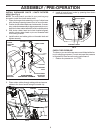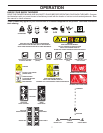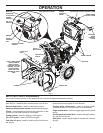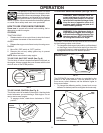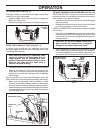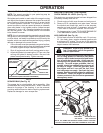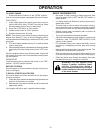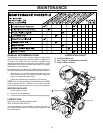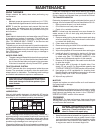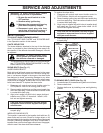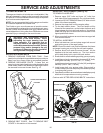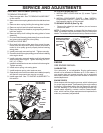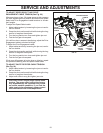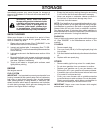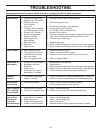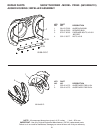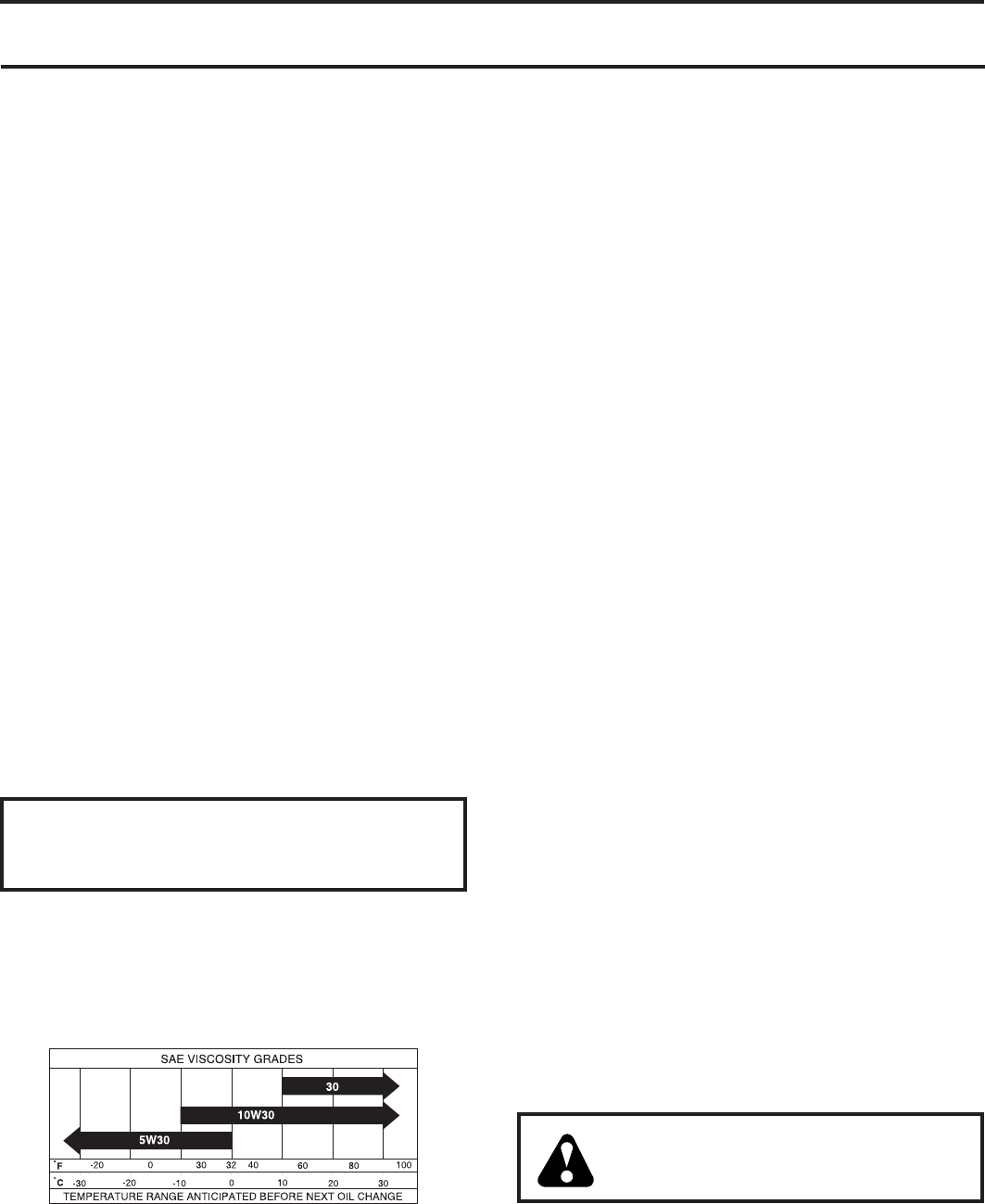
14
CLEANING
IMPORTANT: For best performance, keep snow thrower
housing free of any dirt or trash. Clean the outside of your
snow thrower after each use.
WARNING: Remove safety ignition key
and disconnect spark plug wire from
spark plug. Place wire where it can not
come in contact with spark plug.
• Keep finished surfaces/wheels free of gasoline, oil, etc.
• We do not recommend using a garden hose to clean
your snow thrower unless the electrical system, muffler
and carburetor are covered to keep water out. Water
in engine can result in shortened engine life.
MAINTENANCE
BELTS
Check belts for deterioration and wear after every 50 hours
of operation and replace if necessary. The belts are not
ad just able. Replace belts if they begin to slip from wear.
(See “TO REMOVE BELT COVER” in the Service and
Adjustments section of this manual).
The belts on your snow thrower are of special con struc tion
and should be replaced by original equipment man u fac tur er
(OEM) belts avail able from your nearest dealer. Using other
than OEM belts can cause personal injury or damage to
the snow thrower.
SNOW THROWER
Always observe the safety rules when performing any
main te nance.
TIRES
• Maintain proper air pressure in both tires (14–17 PSI).
• Keep tires free of gasoline and oil, which can harm rubber.
NOTE: To seal tire punctures and prevent flat tires due
to slow leaks, tire sealant may be purchased from your
local parts dealer. Tire sealant also prevents tire dry rot
and cor ro sion.
AUGER GEAR CASE
• The gear case was filled with lubricant to the proper level
at the factory. The only time the lubricant needs atten-
tion is if service has been performed on the gear case.
• If lubricant is required, use only Ronex ED #1 grease.
TRACTION DRIVE SYSTEM
DO NOT lubricate the drive components inside the snow
thrower. The sprockets, hex shafts, drive disc and friction
wheel require no lubrication. The bearings and bushings
are lifetime lubricated and require no maintenance.
CAUTION: Any lubricating of the above com po-
nents can cause contamination of the friction
wheel and damage to the drive system of your
snow thrower.
ENGINE
See engine manual.
LUBRICATION
Use only high quality detergent oil rated with API service
classification SG–SL. Select the oil's SAE viscosity grade
according to your expected operating temperature.
NOTE: Although multi-viscosity oils (5W30, 10W30 etc.)
improve starting in cold weather, these multi-viscosity oils
will result in increased oil consumption when used above
32°F. Check your engine oil level more frequently to avoid
possible engine damage from running low on oil.
Change the oil after every 25 hours of operation or at least once
a year if the snow thrower is not used for 25 hours in one year.
MUFFLER
Inspect and replace corroded muffler as it could cre ate a
fire haz ard and/or dam age.
SPARK PLUG
Replace spark plug at the beginning of each season or after
every 100 hours of operation, whichever occurs first. Spark
plug type and gap setting are shown in the “PROD UCT
SPEC I FI CA TIONS” section of this manual.
Check the crankcase oil level before starting the engine
and after each five (5) hours of continuous use. Tighten oil
fill cap / dipstick securely each time you check the oil level.
TO CHANGE ENGINE OIL
Determine temperature range anticipated before next oil
change. All oil must meet API service classification SG–SL.
• Be sure snow thrower is on level surface.
• Oil will drain more freely when warm.
• Catch oil in a suitable container.
NOTE: A wheel may be removed from snow thrower for
easier access to the oil drain plug and place ment of a
suitable container.
1. Remove safety ignition key and disconnect spark plug
wire from spark plug. Place wire where it cannot come
in contact with spark plug.
2. Clean area around drain plug.
3. Remove drain plug and drain oil in a suitable container.
4. Install drain plug and tighten securely.
5. Wipe off any spilled oil from snow thrower and engine.
6. Install left wheel (if removed for draining oil). Be sure
to install wheel pin and retainer pin into proper hole
in wheel axle (See “TO REMOVE WHEELS” in the
Service and Adjustments section of this manual).
7. Remove oil fill cap/dipstick. Be careful not to allow dirt
to enter the engine.
8. Refill engine with oil through oil dipstick tube. Pour
slowly. Do not overfill. For approximate capacity see
“PRODUCT SPECIFICATIONS” section of this man u al.
9. Use gauge on oil fill cap/dipstick for checking level.
Be sure dipstick cap is tightened securely for accurate
reading. Keep oil at “FULL” line on dipstick.
10. Wipe off any spilled oil.



